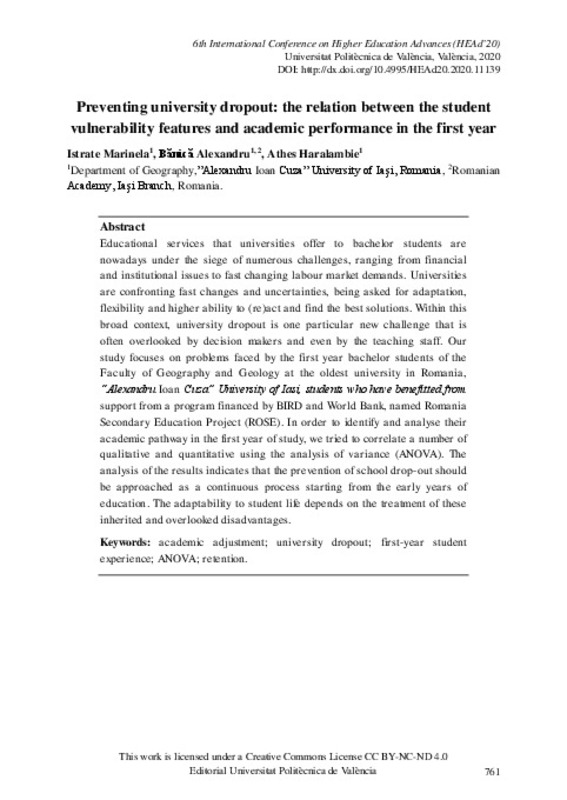JavaScript is disabled for your browser. Some features of this site may not work without it.
Buscar en RiuNet
Listar
Mi cuenta
Estadísticas
Ayuda RiuNet
Admin. UPV
Preventing university dropout: the relation between the student vulnerability features and academic performance in the first year
Mostrar el registro sencillo del ítem
Ficheros en el ítem
| dc.contributor.author | Marinela, Istrate
|
es_ES |
| dc.contributor.author | Alexandru, Bănică
|
es_ES |
| dc.contributor.author | Haralambie, Athes
|
es_ES |
| dc.date.accessioned | 2020-06-10T11:40:10Z | |
| dc.date.available | 2020-06-10T11:40:10Z | |
| dc.date.issued | 2020-04-28 | |
| dc.identifier.isbn | 9788490488119 | |
| dc.identifier.issn | 2603-5871 | |
| dc.identifier.uri | http://hdl.handle.net/10251/145943 | |
| dc.description.abstract | [ES] Educational services that universities offer to bachelor students are nowadays under the siege of numerous challenges, ranging from financial and institutional issues to fast changing labour market demands. Universities are confronting fast changes and uncertainties, being asked for adaptation, flexibility and higher ability to (re)act and find the best solutions. Within this broad context, university dropout is one particular new challenge that is often overlooked by decision makers and even by the teaching staff. Our study focuses on problems faced by the first year bachelor students of the Faculty of Geography and Geology at the oldest university in Romania, “Alexandru Ioan Cuza” University of Iasi, students who have benefitted from support from a program financed by BIRD and World Bank, named Romania Secondary Education Project (ROSE). In order to identify and analyse their academic pathway in the first year of study, we tried to correlate a number of qualitative and quantitative using the analysis of variance (ANOVA). The analysis of the results indicates that the prevention of school drop-out should be approached as a continuous process starting from the early years of education. The adaptability to student life depends on the treatment of these inherited and overlooked disadvantages. | es_ES |
| dc.language | Inglés | es_ES |
| dc.publisher | Editorial Universitat Politècnica de València | es_ES |
| dc.relation.ispartof | 6th International Conference on Higher Education Advances (HEAd'20) | |
| dc.rights | Reconocimiento - No comercial - Sin obra derivada (by-nc-nd) | es_ES |
| dc.subject | Higher Education | es_ES |
| dc.subject | Learning | es_ES |
| dc.subject | Educational systems | es_ES |
| dc.subject | Teaching | es_ES |
| dc.subject | Academic adjustment | es_ES |
| dc.subject | University dropout | es_ES |
| dc.subject | First-year student experience | es_ES |
| dc.subject | ANOVA | es_ES |
| dc.subject | Retention | es_ES |
| dc.title | Preventing university dropout: the relation between the student vulnerability features and academic performance in the first year | es_ES |
| dc.type | Capítulo de libro | es_ES |
| dc.type | Comunicación en congreso | es_ES |
| dc.identifier.doi | 10.4995/HEAd20.2020.11139 | |
| dc.rights.accessRights | Abierto | es_ES |
| dc.description.bibliographicCitation | Marinela, I.; Alexandru, B.; Haralambie, A. (2020). Preventing university dropout: the relation between the student vulnerability features and academic performance in the first year. En 6th International Conference on Higher Education Advances (HEAd'20). Editorial Universitat Politècnica de València. (30-05-2020):761-769. https://doi.org/10.4995/HEAd20.2020.11139 | es_ES |
| dc.description.accrualMethod | OCS | es_ES |
| dc.relation.conferencename | Sixth International Conference on Higher Education Advances | es_ES |
| dc.relation.conferencedate | Junio 02-05,2020 | es_ES |
| dc.relation.conferenceplace | València, Spain | es_ES |
| dc.relation.publisherversion | http://ocs.editorial.upv.es/index.php/HEAD/HEAd20/paper/view/11139 | es_ES |
| dc.description.upvformatpinicio | 761 | es_ES |
| dc.description.upvformatpfin | 769 | es_ES |
| dc.type.version | info:eu-repo/semantics/publishedVersion | es_ES |
| dc.description.issue | 30-05-2020 | |
| dc.relation.pasarela | OCS\11139 | es_ES |








